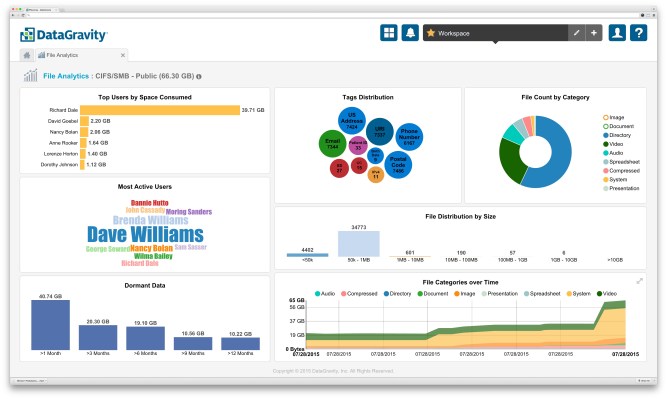DataGravity announced version 2.0 of its storage appliance today, which focuses on data security, particularly knowing what files you have and who’s been accessing them.
When DataGravity emerged last summer with a new concept of data aware storage, it announced a number of key features, but it found that “customers were gravitating most around security at the point of storage,” DataGravity CEO, Paula Long told TechCrunch.
The company concentrated on four main areas in the original release including security and governance, quick restore, search and discover and (of course) storage.
Unlike most storage tools, DataGravity is intelligent, meaning it understands what it’s storing, and that customers can get insight about what’s lurking inside their hard drives. “Everyone found something in their data that they wish they hadn’t,” she said.
That could include personal information like credit cards or social security numbers or people copying files they shouldn’t have. In one case, a lawyer copied all of his files to an external drive before leaving the company, which resulted in the firm suing him. “We were amused by that, suing someone who is already a lawyer,” she joked.
The update enables administrators to subscribe to alerts, so they can be proactive about activity going on inside their storage appliance instead of explicitly having to go to the appliance to learn about security risks. They can receive an email or register the information in a system log, where the information could tie into a tool like Splunk or other logging tool.
It also includes role-based file access to limit who can view sensitive files, tagging to enable administrators to tag files with roles associated with them, the ability to create governance profiles that enable administrators to schedule compliance checks and a special plug-in for VMware to give companies insight into storage inside virtual machines created with VMware.
Long wouldn’t identify exactly how many customers the company has at this point, but she did say that it was more than 20 and less than 100.
For now, the company is focusing on small to medium sized business (SMBs) with between 50 and 2,000 employees. Early customers include higher education, law firms, accounting firms and state and local governments. She hasn’t ruled out larger enterprise customers, but she says that’s down the road at this point
“We provide storage and add to that the ability to understand the storage and visualize it. We probably won’t find our way to data centers at the high end for a few years,” she explained.
DataGravity has raised $92 million with the most recent, $50 million coming last December.
I interviewed Long at TechCrunch Disrupt New York last spring where she talked about starting DataGravity and the sale of her previous company EqualLogic to Dell for $1.4 billion in November, 2007.
